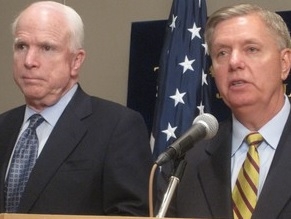|
World Jewish News

US SENATORS John McCain and Lindsey Graham address a news conference in Jerusalem, 30 June 2013. Photo: STEVE LINDE
|
US senators in Cairo urge dialogue and no violence in Egypt crisis
06.08.2013 Two US senators visiting Cairo on Tuesday urged both sides in Egypt's political crisis to start a national dialogue and to avoid violence.
Senators Lindsey Graham and John McCain, on a mission for US President Barack Obama to help resolve the crisis brought on by the overthrow of President Mohamed Morsi last month, also called for the release of political prisoners.
It would be the wrong time to cut off military aid to Egypt as a response to Morsi's removal by the army, they told a news conference.
The state news agency MENA said only that the when the US representatives met with Egyptian army chief General Abdel Fattah al-Sisi, the sides exchanged views on political developments and discussed efforts to end "the state of political polarization".
Army chief of staff Lieutenant General Sedki Sobhi and US Ambassador Anne Patterson also attended the meeting. The senators also met interim Vice President Mohamed ElBaradei.
Egypt has been dangerously divided since the overthrow of Morsi on July 3 following huge demonstrations against his rule.
Morsi became Egypt's first freely-elected president in June 2012, 16 months after the overthrow of US-backed strongman Hosni Mubarak, who had ruled for nearly 30 years. The ousted head of state is now being detained at an undisclosed location.
Thousands of his supporters remain camped out in two protest sites in Cairo which the government has pledged to break up.
Almost 300 people have been killed in political violence since Morsi's overthrow, including 80 shot dead by security forces in a single incident on July 27.
A diplomatic push led by the envoys from the United States, the European Union, Qatar and the United Arab Emirates has so far helped to hold off further bloodshed between Morsi's backers and the security forces but not achieved a breakthrough.
"Things should move soon, otherwise we shall miss this opportunity. This is all still incredibly fragile." said a source involved in the diplomatic initiative.
US DILEMMA
Before leaving the United States, Graham had said the Egyptian military must back out of politics quickly or risk a cut-off of the $1.5 billion it receives in military each year from Washington.
The crisis has put US policy in quandary. Mubarak was close ally who kept Islamist militants under heel and maintained peace with Israel. Washington was slow to support the popular uprising that ousted him.
It cautiously welcomed the election of Morsi, an Islamist and member of the Muslim Brotherhood, and until the last minute Ambassador Patterson was urging Egyptians to use the ballot box rather than street action to express their views.
Fears that Morsi was trying to establish an Islamist autocracy, coupled with a failure to ease economic hardships afflicting most of Egypt's 84 million people, led to huge street demonstrations, triggering the army move.
Washington declined to characterize the army move as a coup - a definition that would trigger an aid cut-off - and US Secretary of State John Kerry last week said the army had acted to restore democracy at the urging of millions of Egyptians.
Nonetheless, many supporters of the army-installed interim government believe the United States still favors Morsi.
At Tahrir Square, the centre of public protest, banners accuse Obama of supporting terrorism and tell Patterson to go home. Her appointment to a new post was announced last week.
On Monday, US Deputy Secretary of State William Burns and European Union envoy Bernardino Leon met jailed Brotherhood deputy leader Khairat El-Shater in the prison where he is being held.
They tried to persuade him to accept the new reality, with no realistic prospect of Morsi being reinstated, and accept a political compromise. A Brotherhood spokesman said Shater had insisted they should be talking to Morsi and the only solution was the "reversal of the coup". A source briefed by the negotiators said the meeting had been useful and constructive.
The military has laid out a plan that could see a new head of state elected in roughly nine months. The Brotherhood says it wants nothing to do with it.
Government political adviser Mostafa Hegazy said the authorities would have to deal with the protesters at the Brotherhood camps at Rabaa al-Adawiya and al-Nahda Square to create the right conditions for the transition plan.
"The crowds exist not to find a solution or to enter political life but to disrupt everyday life and endanger the future of the nation," he told MENA. "They need to renounce violence and stop carrying weapons."
The security forces have promised the protesters safe exit if they quit the camps but have warned their patience is limited.
It is thought unlikely that they would take action before Sunday, the end of Eid al-Fitr, the holiday that marks the close of the Muslim fasting month of Ramadan.
JPost.com
|
|
